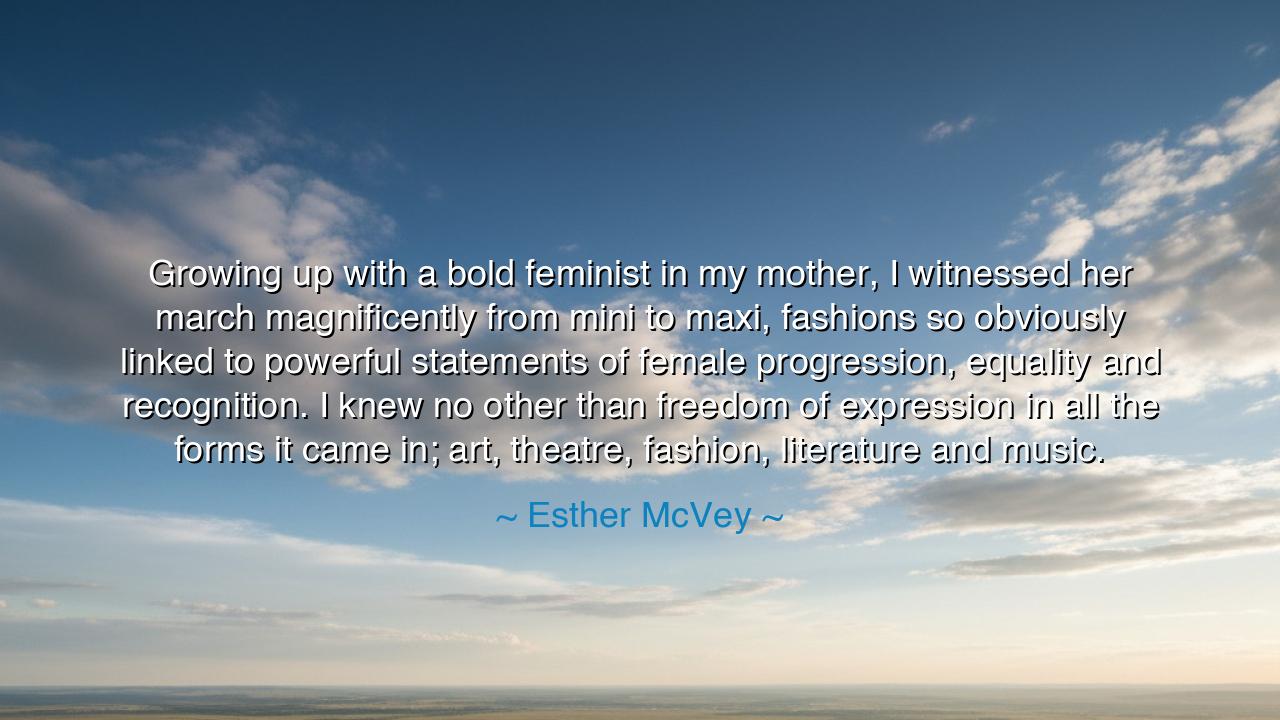
Growing up with a bold feminist in my mother, I witnessed her
Growing up with a bold feminist in my mother, I witnessed her march magnificently from mini to maxi, fashions so obviously linked to powerful statements of female progression, equality and recognition. I knew no other than freedom of expression in all the forms it came in; art, theatre, fashion, literature and music.






Growing up with a bold feminist in my mother, the words of Esther McVey ring with a deep and reverent truth—one that speaks of the enduring power of freedom and self-expression. To witness such strength, to be raised by a woman who embodied the very essence of feminism, was to be bathed in a world where equality, recognition, and the pursuit of liberation were not distant dreams but living, breathing forces shaping the world around her. From her mini to her maxi, the journey of her fashion was not merely about cloth and thread but about powerful statements that reverberated through the very heart of society. Fashion was her armor, her weapon of choice, a medium through which she declared her freedom and autonomy in a world that too often sought to silence her.
The story of Esther McVey’s upbringing is not merely personal—it is the story of many generations of women who have fought for the right to express themselves fully, without restraint. Feminism, at its core, is the fight for the liberation of the self—the right to choose one's own path, to stand in one's own truth, and to wear that truth proudly, like a banner raised high. The mini skirt, once a symbol of youthful rebellion, was more than just a fashion; it was a declaration. It was a mark of freedom, a challenge to the old, oppressive systems that sought to constrain and define women by their limitations, rather than their limitless potential. The maxi followed, a more mature evolution, but still a fierce symbol of a woman’s right to control her own body and her own identity.
To be raised by such a mother was to witness the unfolding of a grand story—one that took place not only in the homes and hearts of those who knew her but across the very fabric of society itself. Esther McVey speaks of freedom of expression in its many forms: through art, theatre, fashion, literature, and music. Each of these forms is a battleground in the greater war for equality and recognition. Each of them represents a territory where women have fought and continue to fight for a seat at the table, for their voices to be heard, for their stories to be told. Art has always been a reflection of the world; theatre a place of profound transformation; literature a sacred space for the soul to be revealed; fashion a public performance of identity; and music the pulse of the heart, beating to the rhythm of freedom and power.
Consider the great women of history who have used these very forms to make their mark. The great Virginia Woolf, whose words shaped the landscape of feminist literature; the fearless Josephine Baker, whose music and dance defied the racial and gendered restrictions of her time; and the brilliant Coco Chanel, whose fashion redefined womanhood and liberated women from the corsets of the past. These women, like Esther’s mother, did not simply follow trends or fashion; they created them, each stitch, each note, each word a challenge to the world that sought to limit them. Through their art, their expressions, they said to the world, "I am here, I am powerful, I am free." And in doing so, they made room for the rest of us to step into our own light.
This legacy of freedom and expression teaches us a valuable lesson: that the world is shaped not by those who conform but by those who dare to be. Whether through the clothes we wear, the words we speak, or the art we create, we are making a statement about who we are and what we stand for. The pursuit of equality is not a passive act; it requires the boldness to stand in our own truth, to express our identity in all its complexity and richness, and to demand the space to do so. Esther McVey’s reflection upon her mother’s influence is a reminder that the fight for recognition is ongoing, and it must be carried forward with courage and conviction.
And yet, this call to action is not just for women but for all people who seek freedom and justice. To live a life of expression, free from the constraints imposed by society, is a universal desire—a desire that transcends gender, race, and class. We must all strive to create a world where each individual, regardless of their background, is free to express themselves fully, to make their mark upon the world, and to be recognized for their contributions. Equality is not just a political ideal; it is a fundamental right, a birthright of all who walk upon the earth.
In our own lives, we are called to be the bold feminist, the courageous artist, the fearless creator. We must embrace the legacy of those who have come before us, whether they be our mothers, our grandmothers, or the historical figures who have fought for freedom and expression. The lessons they impart are not just for the past, but for the present and the future. We must be willing to express ourselves fully and proudly, to challenge the systems that seek to constrain us, and to create spaces where all voices are heard, all identities are validated, and all stories are told. Only then can we say that we have truly embraced the freedom of expression that Esther McVey speaks of—and in doing so, we will carve a path for future generations to walk in their own magnificent truth.






AAdministratorAdministrator
Welcome, honored guests. Please leave a comment, we will respond soon